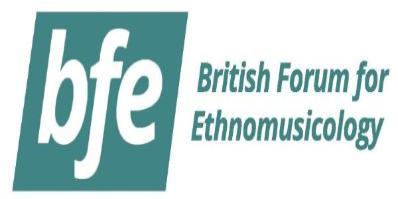
(In)visible Publics: Performing (Non)Belonging
Friday 13 September 2024
Conference Details
Date13th September 2024
Time9:30am - 5:00pm
FeeFree
LocationOnline
OrganisersDr Chrysi Kyratsou
Sponsors British Forum for Ethnomusicology
Register HereThe recent increase of hate-discourses and anti-migrant/refugee protests foreground the contested nature of individual and collective identities. Furthermore, they exemplify certain narratives regarding migrants’/refugees’ presence in Ireland, and they indicate certain modes of how they are represented in public discourses.
Individual and collective identities manifest at the intersection of the conditions that determine the terms under which publics become (in)visible. In turn, they highlight certain aspects of their life- worlds and life-trajectories while distorting or silencing others. These terms and conditions further indicate the varying terms and degree of publics’ inclusion/exclusion in or from society. The varying degrees of diverse publics’ inclusion/exclusion can be understood in the ways that diverse publics are represented in official and colloquial discourses, the access they have to resources, funding, (public) space, the ways in which they may become (in)visible.
While nationality and ethnicity can be factors suggesting different modes of publics’ inclusion/exclusion, they are not the only ones. Class, religion, sex, gender, language, disabilities, may be devised as determinants, imbued with value that results in varying modes of inclusion/exclusion, and the list is not comprehensive. Accordingly, senses of (non)belonging are formed.
Therefore, it is imperative to explore the ways in which narratives underpinning the contestations of individual and collective identities shape enactments of (non)belonging. Furthermore, it is equally urgent to examine the modes in which (non)belonging is performed across (extra)ordinary contexts.
The notion of ‘performance’ and accordingly ‘performing (non)belonging’ shifts the point of focus to the engaged actors, and accordingly urges us to trace the ground upon which their everyday experiences unfold (Yuval-Davis 2011). Senses and expressions, and consequently performance of (non)belonging are changeable and liminal, as they reflect the agentive interplay between external (i.e. societal) and internal (i.e. communal) developments.
Furthermore, ‘performance’ is underpinned by liminality (Turner 2008; 1967), in that, while occurring within specific spatio-temporal parameters, its preparation occurs outside these contexts, and its impact is lingering, continuing to affect those who participated (performers, producers, listeners, viewers), and thus revealing a kind of transformative potential. Finally, performance highlights the interconnection between performers and observers. In this sense, it underlines engaged actors’ modes of (in)visibility, and their agentive practices of (non)belonging.
We employ the notion of ‘performance’ in our conference, to shift the focus on the conscious actors who agentively manipulate the conditions of their inclusion/exclusion and the respective discourses of their representation, in order to shape and express their modes of (non)belonging. We welcome a broad definition of performance that includes artistic and creative endeavours, as well as protest, journalism, and state politics, from both historical and contemporary perspectives.
Organising Committee:
- Chrysi Kyratsou (IRC Postdoctoral Research Fellow, Anthropology/Music)
- Jaime Jones (Associate Professor, Music)
- Subhashini Goda Venkataramani (PhD candidate, Music/Dance)
- Nicolas Pillai (Assistant Professor, Film/Creative Futures)
- Pedzisai Maedza (Assistant Professor, Drama)
- Irial Glynn (Assistant Professor, History)
- Lisa Foran (Assistant Professor, Philosophy)
Kindly supported by:

Conference Programme and Abstracts
- The full conference programme is available to view here.
- Abstracts for the conference are available to download below.
